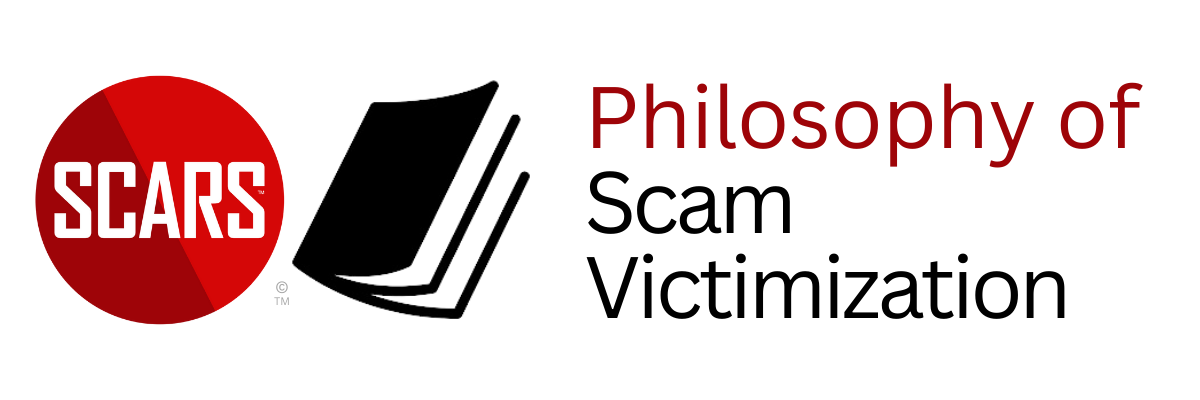‘The Wolf and His Shadow’ – an Aesop’s Fable
A Lesson for Scam Victims about Overconfidence and Vulnerability
Primary Category: Philosophy of Scam Victimization
Author:
• Tim McGuinness, Ph.D., DFin, MCPO, MAnth – Anthropologist, Scientist, Polymath, Director of the Society of Citizens Against Relationship Scams Inc.
About This Article
The fable of The Wolf and His Shadow, Aesop offers a timeless lesson on the dangers of pride and illusion, warning against letting distorted perceptions cloud judgment. For scam victims, it provides a powerful reflection on how misplaced confidence in one’s invulnerability can lead to deception and loss. Before a scam, individuals may believe themselves immune, dismissing warnings and underestimating threats. During a scam, they may cling to initial assumptions, deepening their entrapment. Afterward, some shift to shame and hopelessness. The fable teaches the importance of balanced self-awareness, encouraging scam victims to recognize vulnerability without succumbing to defeat, fostering growth, resilience, and clearer judgment.
Note: This article is intended for informational purposes and does not replace professional medical advice. If you are experiencing distress, please consult a qualified mental health professional.

The Wolf and His Shadow – an Aesop Fable: A Lesson for Scam Victims
Understanding Aesop
Aesop (Æsop) was a storyteller believed to have lived in ancient Greece between 620 and 564 BCE, and is credited with the creation of a collection of fables that have endured through the centuries. His stories, known as Aesop’s Fables, are short tales designed to convey practical moral lessons. These fables use animals with human characteristics to illustrate ethical principles and human behavior. Aesop’s goal was not merely to entertain but to educate, providing guidance on virtues such as humility, honesty, and prudence. His lessons are simple yet profound, crafted to reveal timeless truths about the human condition.
The Fable: The Wolf and His Shadow
A Wolf left his lair one evening in fine spirits and an excellent appetite. As he ran, the setting sun cast his shadow far out on the ground, and it looked as if the wolf were a hundred times bigger than he really was.
“Why,” exclaimed the Wolf proudly, “see how big I am! Fancy me running away from a puny Lion! I’ll show him who is fit to be king, he or I.”
Just then an immense shadow blotted him out entirely, and the next instant a Lion struck him down with a single blow.
Do not let your fancy make you forget realities.
The General Meaning of the Fable
The fable speaks clearly to the dangers of pride and illusion. The Wolf, enamored with the size of his shadow, misjudges his true strength. He allows a distorted image to shape his perception, believing himself invincible. The Lion, a real and immediate threat, reminds him of the reality he ignored.
The moral of this fable: do not let your fancy make you forget realities, cautions against allowing pride, vanity, or illusion to cloud judgment.
The story illustrates a common human tendency: the elevation of self-image beyond actual ability or circumstance. When individuals lose sight of reality and act based on inflated perceptions, they expose themselves to dangers they are ill-prepared to face.
Applying the Fable to Scam Victims
Before the Scam
Many scam victims, prior to their experience, view themselves as savvy, cautious, or even immune to deception. They believed that scams only happen to the naive or careless. This belief acts much like the Wolf’s shadow, enlarging their sense of invulnerability. Trusting in their intelligence or past experiences, they underestimate the sophistication and psychological tactics used by modern scammers.
The Wolf’s mistake parallels this mindset. By overestimating his size and power, he dismissed the possibility that he could be overpowered. Scam victims often dismiss red flags because they believe they would “know” if they were being deceived. They trust their judgment without recalibrating it against the ever-evolving methods used by fraudsters.
This misplaced confidence can lead victims to ignore warnings, bypass standard precautions, or rationalize suspicious behavior. Just as the Wolf failed to acknowledge its real size compared to the Lion, scam victims may fail to recognize their vulnerabilities in the face of skilled deception.
During the Scam
Once engaged, victims often remain blind to reality, clinging to the belief that their initial judgment must have been correct. Cognitive dissonance: the discomfort of realizing one might be wrong, pushes them to defend their choices rather than question them. They focus on confirming what they want to believe, much like the Wolf basking in the illusion of his grand shadow, rather than examining the situation with clear eyes.
This stage is particularly dangerous. It is when scam victims often escalate their involvement, investing more time, emotion, and resources, believing that everything is under control. The illusion grows stronger the more it is fed, distancing them further from the truths they need to acknowledge.
After the Scam
In the aftermath, some victims shift to the opposite extreme, believing that their vulnerability is now total, that they are permanently damaged or foolish. They allow shame and self-reproach to cloud their recovery. The Wolf’s downfall is a reminder that while self-deception can lead to harm, recognizing reality can be the first step toward healing.
Understanding that everyone is vulnerable to manipulation can dismantle the unhealthy pride that led to the fall, without replacing it with debilitating shame. Scam victims benefit by learning to see themselves accurately—neither invincible nor helpless—but human, capable of growth and wiser decision-making.
Lessons for Scam Victims
The lesson from The Wolf and His Shadow encourages scam victims to cultivate self-awareness. It suggests a balanced view of oneself, free from both exaggerated pride and destructive self-condemnation. Vigilance begins with humility—recognizing that anyone can be deceived given the right circumstances.
Practical steps include:
- Regularly questioning assumptions, especially when emotions are heavily involved.
- Acknowledging that confidence should be paired with caution.
- Seeking external perspectives when faced with significant decisions.
- Remembering that professional scammers exploit emotional triggers and cognitive biases.
Scam victims can use the wisdom of this fable to rebuild with clearer vision. By accepting the reality of their past vulnerability without being defined by it, they position themselves to move forward stronger and more resilient.
The Enduring Wisdom of Aesop
Aesop’s fables endure precisely because they capture essential truths in simple narratives. The Wolf and His Shadow remains relevant today, offering valuable insights not just about pride, but about the importance of clear-eyed self-assessment. Scam victims can find in it a useful guide: a reminder that reality, even when uncomfortable, is always safer than illusion.
We will apply more of Aesop’s wisdom in the future.
-/ 30 /-
What do you think about this?
Please share your thoughts in a comment below!
Important Information for New Scam Victims
- Please visit www.ScamVictimsSupport.org – a SCARS Website for New Scam Victims & Sextortion Victims.
- SCARS Institute now offers its free, safe, and private Scam Survivor’s Support Community at www.SCARScommunity.org – this is not on a social media platform, it is our own safe & secure platform created by the SCARS Institute especially for scam victims & survivors.
- SCARS Institute now offers a free recovery learning program at www.SCARSeducation.org.
- Please visit www.ScamPsychology.org – to more fully understand the psychological concepts involved in scams and scam victim recovery.
If you are looking for local trauma counselors, please visit counseling.AgainstScams.org
If you need to speak with someone now, you can dial 988 or find phone numbers for crisis hotlines all around the world here: www.opencounseling.com/suicide-hotlines
Statement About Victim Blaming
Some of our articles discuss various aspects of victims. This is both about better understanding victims (the science of victimology) and their behaviors and psychology. This helps us to educate victims/survivors about why these crimes happened and not to blame themselves, better develop recovery programs, and help victims avoid scams in the future. At times, this may sound like blaming the victim, but it does not blame scam victims; we are simply explaining the hows and whys of the experience victims have.
These articles, about the Psychology of Scams or Victim Psychology – meaning that all humans have psychological or cognitive characteristics in common that can either be exploited or work against us – help us all to understand the unique challenges victims face before, during, and after scams, fraud, or cybercrimes. These sometimes talk about some of the vulnerabilities the scammers exploit. Victims rarely have control of them or are even aware of them, until something like a scam happens, and then they can learn how their mind works and how to overcome these mechanisms.
Articles like these help victims and others understand these processes and how to help prevent them from being exploited again or to help them recover more easily by understanding their post-scam behaviors. Learn more about the Psychology of Scams at www.ScamPsychology.org
SCARS INSTITUTE RESOURCES:
If You Have Been Victimized By A Scam Or Cybercrime
♦ If you are a victim of scams, go to www.ScamVictimsSupport.org for real knowledge and help
♦ SCARS Institute now offers its free, safe, and private Scam Survivor’s Support Community at www.SCARScommunity.org/register – this is not on a social media platform, it is our own safe & secure platform created by the SCARS Institute especially for scam victims & survivors.
♦ Enroll in SCARS Scam Survivor’s School now at www.SCARSeducation.org
♦ To report criminals, visit https://reporting.AgainstScams.org – we will NEVER give your data to money recovery companies like some do!
♦ Follow us and find our podcasts, webinars, and helpful videos on YouTube: https://www.youtube.com/@RomancescamsNowcom
♦ Learn about the Psychology of Scams at www.ScamPsychology.org
♦ Dig deeper into the reality of scams, fraud, and cybercrime at www.ScamsNOW.com and www.RomanceScamsNOW.com
♦ Scam Survivor’s Stories: www.ScamSurvivorStories.org
♦ For Scam Victim Advocates visit www.ScamVictimsAdvocates.org
♦ See more scammer photos on www.ScammerPhotos.com
You can also find the SCARS Institute’s knowledge and information on Facebook, Instagram, X, LinkedIn, and TruthSocial
Psychology Disclaimer:
All articles about psychology and the human brain on this website are for information & education only
The information provided in this and other SCARS articles are intended for educational and self-help purposes only and should not be construed as a substitute for professional therapy or counseling.
Note about Mindfulness: Mindfulness practices have the potential to create psychological distress for some individuals. Please consult a mental health professional or experienced meditation instructor for guidance should you encounter difficulties.
While any self-help techniques outlined herein may be beneficial for scam victims seeking to recover from their experience and move towards recovery, it is important to consult with a qualified mental health professional before initiating any course of action. Each individual’s experience and needs are unique, and what works for one person may not be suitable for another.
Additionally, any approach may not be appropriate for individuals with certain pre-existing mental health conditions or trauma histories. It is advisable to seek guidance from a licensed therapist or counselor who can provide personalized support, guidance, and treatment tailored to your specific needs.
If you are experiencing significant distress or emotional difficulties related to a scam or other traumatic event, please consult your doctor or mental health provider for appropriate care and support.
Also read our SCARS Institute Statement about Professional Care for Scam Victims – click here
If you are in crisis, feeling desperate, or in despair, please call 988 or your local crisis hotline – international numbers here.
More ScamsNOW.com Articles
A Question of Trust
At the SCARS Institute, we invite you to do your own research on the topics we speak about and publish. Our team investigates the subject being discussed, especially when it comes to understanding the scam victims-survivors’ experience. You can do Google searches, but in many cases, you will have to wade through scientific papers and studies. However, remember that biases and perspectives matter and influence the outcome. Regardless, we encourage you to explore these topics as thoroughly as you can for your own awareness.















![NavyLogo@4x-81[1] The Wolf and His Shadow - an Aesop's Fable - 2025](https://scamsnow.com/wp-content/uploads/2025/04/NavyLogo@4x-811.png)









![scars-institute[1] The Wolf and His Shadow - an Aesop's Fable - 2025](https://scamsnow.com/wp-content/uploads/2025/04/scars-institute1.png)

![niprc1.png1_-150×1501-1[1] The Wolf and His Shadow - an Aesop's Fable - 2025](https://scamsnow.com/wp-content/uploads/2025/04/niprc1.png1_-150x1501-11.webp)